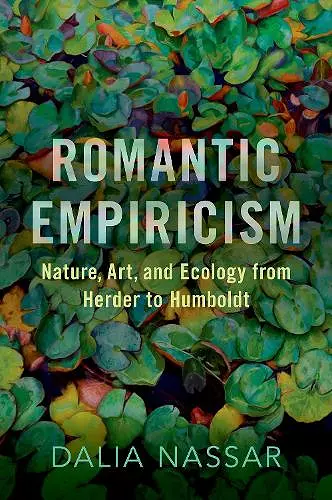Romantic Empiricism
Nature, Art, and Ecology from Herder to Humboldt
Format:Hardback
Publisher:Oxford University Press Inc
Published:16th Aug '22
Currently unavailable, our supplier has not provided us a restock date

In Romantic Empiricism, Dalia Nassar distinguishes and explores an understudied philosophical tradition that emerged in Germany in the late eighteenth and early nineteenth centuries, traces its development, and argues for its continued significance. Moving from the late Kant's notion of reflecting judgment, to Herder's articulation of the idea of "animal worlds," Goethe's explication of the obligations of the scientist, and Alexander von Humboldt's aesthetic science, Nassar demonstrates how these thinkers developed a sophisticated empirical approach to the natural world, which focuses on the phenomenon while also recognizing the creative role of the knowing subject and the cognitive value of art and aesthetic experience. She explores how these four thinkers worked together-sometimes as rivals, but more often than not as teachers and collaborators-and illustrates how their search for a new methodology culminated in a new, ecological understanding of the world and the human place within it. Revisiting their thought, especially their distinctive approach to the study of nature, Nassar demonstrates, has the potential to redirect contemporary environmental debates and respond to urgent ecological questions in new and productive ways.
A sea change is taking place in the understanding of German Romantic science, and Nassar's study adds significantly to that impulse. She traces the line that originates in Herder's controversial relation with Kant and flows into Goethe and Alexander von Humboldt, giving it a provocative name: Romantic empiricism. Moreover, she highlights the contemporary importance of this line for new ideas in environmentalism and the practice of natural science. All of this I find both cogent and propitious. * John Zammito, Rice University *
Erudite, eloquent, and cogently argued, Dalia Nassar's brilliant new book challenges many engrained assumptions about European romanticism to make a compelling case for both the historical novelty of the romantic empiricism that she identifies in the work of Kant, Herder, Goethe and Humboldt, and of its continuing relevance to current discussions of epistemology and ontology, aesthetics and ethics, corporeality and cognition, affect and judgement, above all with respect to ecological thinking and the urgent global challenges to which it is called to respond. Romantic Empiricism is no less original and important than the new ways of knowing, valuing and engaging with the natural world that Nassar reconstructs within German romanticism. Whatever you think you know about the Romantic period and its historical legacies, this book is bound to make you think again. * Kate Rigby, Bath Spa University and Monash University *
Romantic Empiricism offers a new methodology of knowing nature, pairing the observation of phenomena with distinctive cognitive aspects intrinsic to aesthetic processes. This method is also implicated in the text's narrative style that allows readers to follow along in otherwise dense philosophical discussions. * Meryem Deniz, The Monatshefte *
Thorough and carefully reasoned, Romantic Empiricism is perhaps one-and-a-half books in one-philosophy of science and history thereof-shifting from re-litigationof Kant and Herder to lively readings of Goethe's poetry and Humboldt's prose. If laborious at times, Nassar's comprehensive approach has yielded a solid referencefor anyone interested in the history of environmental thought and its import for our crisis-addled moment. * Ambika S. Athreya, German Studies Review *
ISBN: 9780190095437
Dimensions: 238mm x 163mm x 25mm
Weight: 576g
328 pages